From Cooking to Communion: 10 Family-Friendly Ways to Transform Your Kitchen Into a Dining Room Oasis
Welcome, dear reader! If you’ve ever sat down for a meal in your kitchen and thought, "This space could use a little more… magic," then you're not alone. For many families, the kitchen is already the heart of the home — where meals are made, homework gets done, and stories are shared. But with a few smart design tweaks, you can transform your kitchen into a true dining room oasis that’s both functional and fun.
In this blog post, we’ll explore 10 family-friendly ways to bridge the gap between kitchen and dining room, whether you’re working with a cozy apartment or a sprawling suburban home. Let’s dive in!
Why Bother Blending Kitchen and Dining Spaces?
The days of formal dining rooms collecting dust while everyone eats at the kitchen counter are fading fast. Modern family life demands flexibility, and our spaces should reflect that. By intentionally blending your kitchen and dining areas, you create a cohesive environment that encourages connection, creativity, and convenience.
1. Create a Visual Flow Between Zones
- Use color continuity: Keep your paint scheme consistent across both zones. A shared neutral base with pops of coordinating accent colors will make the transition feel seamless.
- Mirrored lighting: Choose pendant lights over the island and dining table that echo each other in shape or finish, but vary in scale.
- Rug runners: If you have a hallway-style layout, place a rug runner to guide movement and visually link the two areas.
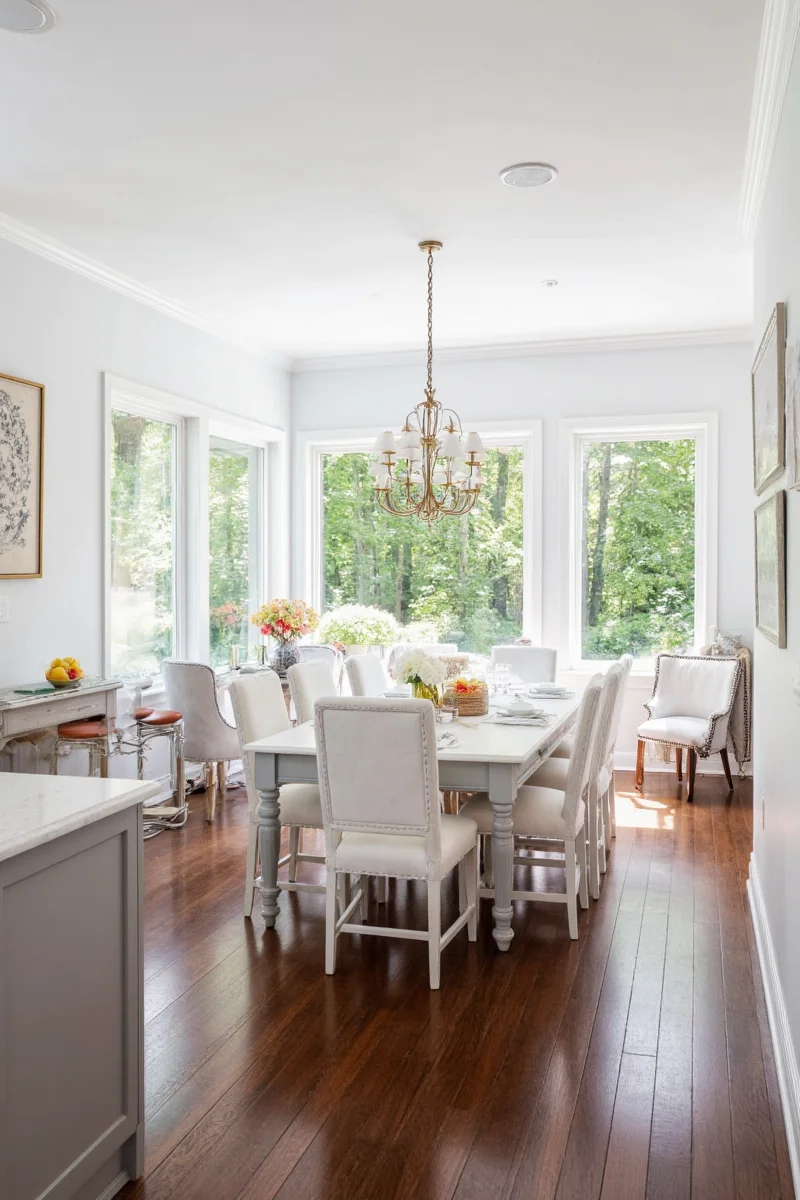
2. Designate a Seating Area Within the Kitchen
If square footage is tight, turn part of your kitchen into a mini dining nook without losing functionality.
| Option | Description | Best For |
|---|---|---|
| Breakfast Nook | Built-in bench with a small round or rectangular table | Families with kids under 10 |
| Bar Stools + Island | Add seating around existing kitchen island | Younger families or singles |
| Extend the Counter | Create an overhang for casual dining or homework stations | Homes with open kitchens |
3. Invest in Multi-Functional Furniture
When your dining area shares real estate with the kitchen, every piece of furniture needs to earn its keep. Look for pieces that do double (or triple!) duty.
Top Picks for Multi-Functionality:
- Storage Benches: Hidden compartments inside can hold napkins, placemats, or even board games.
- Dining Tables with Leaves: Expandable tables give you flexibility for daily meals and large gatherings alike.
- Sideboards with Serving Trays: Great for storage and doubling as temporary buffet setups during parties.
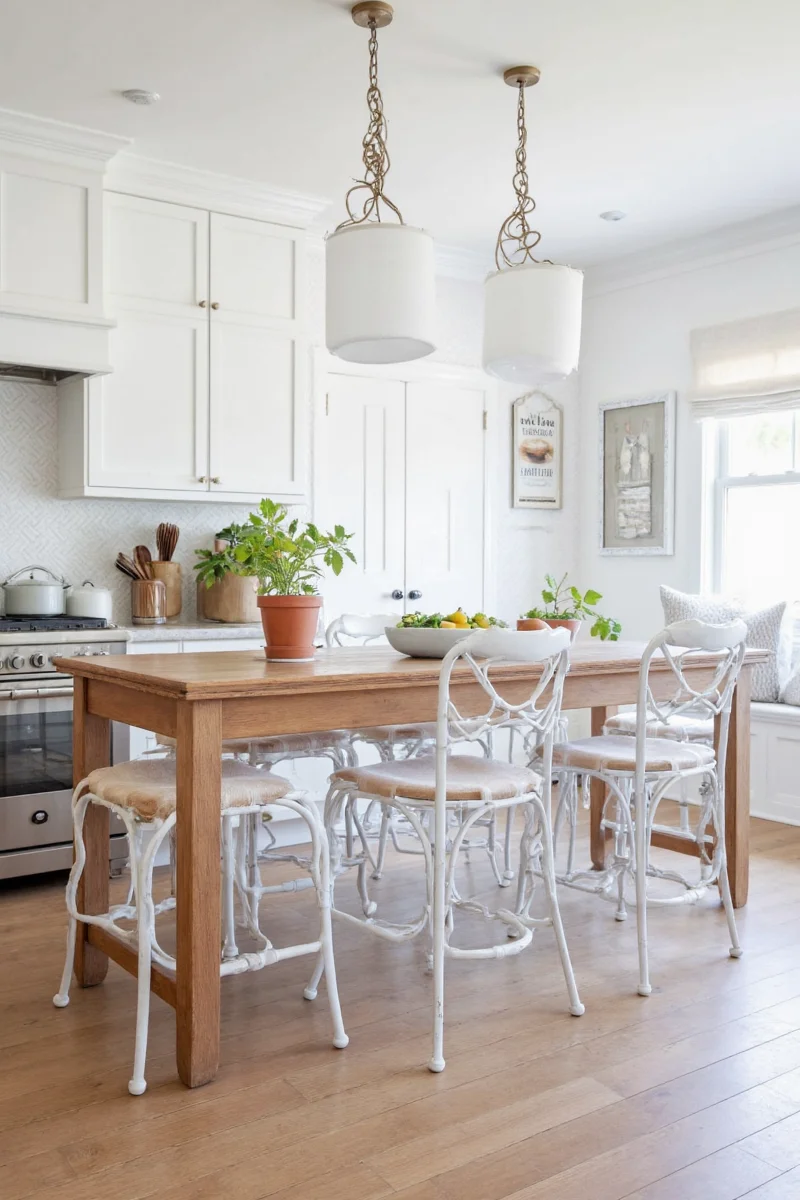
4. Add Personality with Decor That Grows With Your Family
Kids grow up quickly, so opt for decor that’s playful yet timeless. Here are some ideas:
- Chalkboard Wall Panels: Perfect for doodling, menus, or leaving sweet notes.
- Framed Art Gallery: Include a mix of professional prints and children’s masterpieces. Swap them seasonally!
- Customized Tableware: Personalized plates or cups for each family member add charm and prevent confusion.
5. Lighting Matters — Layer It Like You Layer Clothing
Lighting can totally transform how a space feels. In a kitchen-dining hybrid, you need layers:
- Ambient Light: Recessed ceiling lights for general illumination.
- Task Lighting: Under-cabinet lights and pendants over prep areas.
- Accent/Décor Lighting: String lights, lanterns, or statement chandeliers.
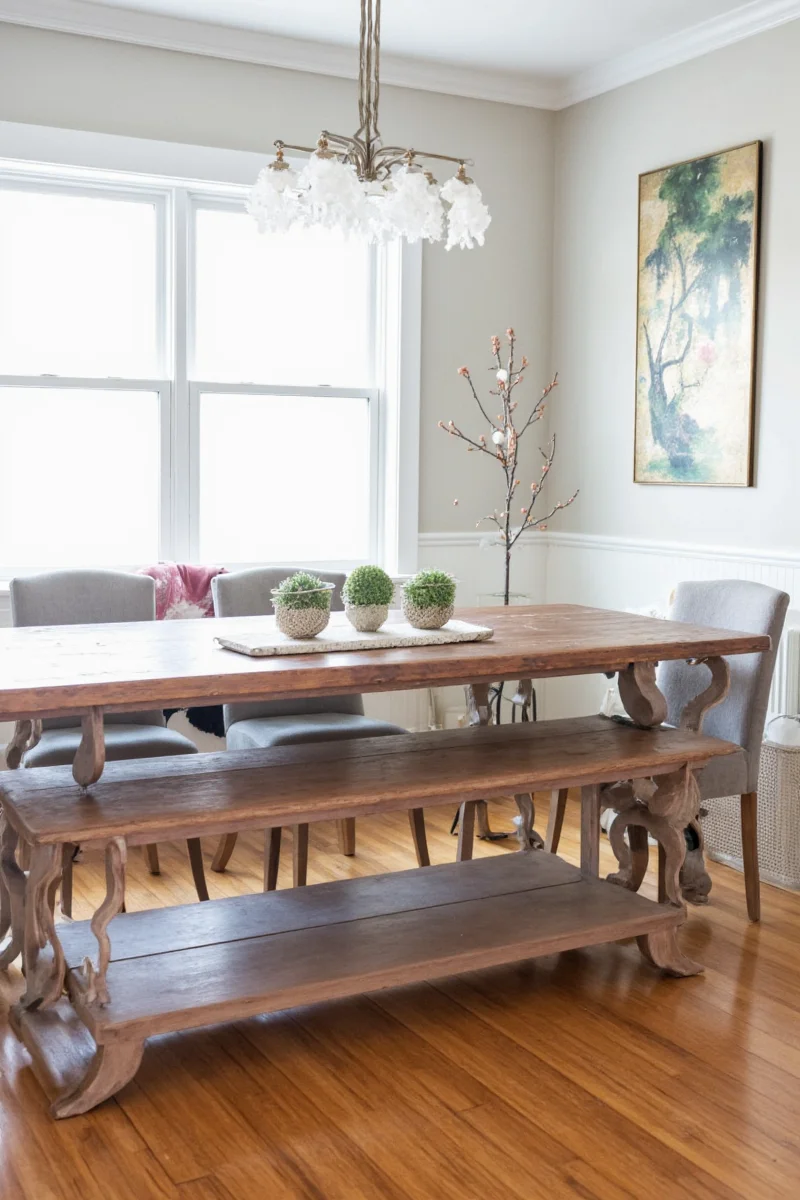
6. Don’t Forget About Storage Solutions
When the dining zone is part of the kitchen, clutter becomes visible faster. Smart storage is key.
- Open Shelving with Baskets: Stylish yet practical for storing toys, linens, or off-season decor.
- Sliding Barn Doors: Hide pantry items or extra dining supplies behind chic doors.
- Cubby Units: Ideal for storing backpacks, books, or kid-sized dining sets.
7. Choose Materials That Can Handle Family Life
Let’s be honest — kids spill. Pets knock things over. So when selecting materials, durability is key.
| Surface | Pros | Cons |
|---|---|---|
| Quartz Countertops | Scratch-resistant, non-porous, easy to clean | Expensive |
| Vinyl Plank Flooring | Waterproof, warm underfoot, budget-friendly | Lacks natural wood texture |
| Upholstered Bench Cushions | Washable covers, soft seating | Require regular cleaning |
8. Bring Nature Indoors for a Calming Vibe
Greenery adds life, literally and figuratively, to any space. Even if you’re not a plant pro, these options thrive indoors:
- Snake Plant: Virtually indestructible, great air purifier.
- Pothos Vine: Tolerates low light, looks lovely hanging from shelves.
- Mini Herb Garden: Place on windowsill — kids love watering and harvesting.
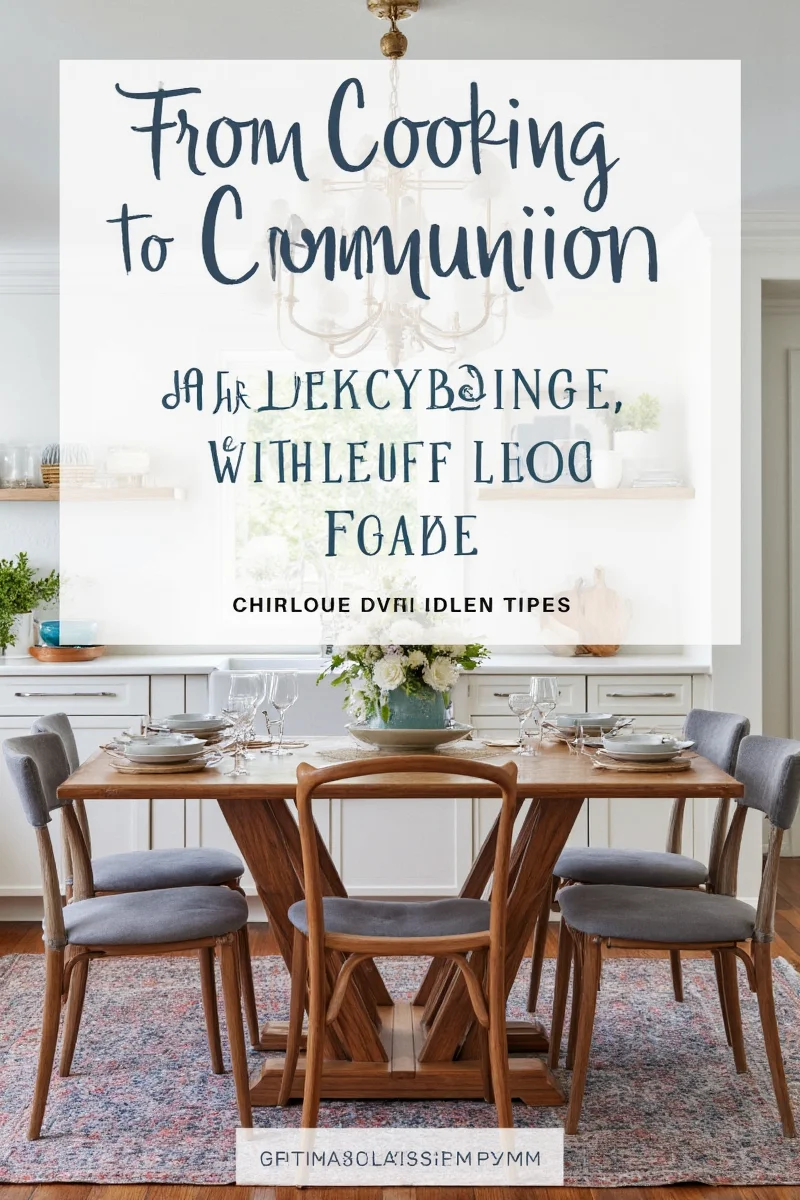
9. Make It Holiday-Ready Year-Round
Whether it's Thanksgiving dinner or a birthday brunch, your space should be ready for celebrations. Think modular decor that can easily switch out for seasonal flair.
- Modular Wreaths: Change centerpieces seasonally without replacing the whole wreath.
- Festive Table Linens: Have a few sets for holidays — Santa print for Christmas, bunnies for Easter.
- Dinnerware Sets by Theme: Halloween mugs, Valentine’s Day plates — collect gradually and swap them in.
10. The Ultimate Family Test: Does It Pass the Spaghetti Sauce Check?
Here’s a lighthearted tip from my own kitchen-turned-dining-room experience: Ask yourself — does this setup survive spaghetti sauce on white walls? Toddlers wielding forks like swords? Teenagers who forget to wipe crumbs after midnight snacks?
If your answer is “yes” or “I’ve got stain remover for that,” you’re golden. Otherwise, maybe rethink the ivory linen curtains and antique candle sconces until the kids go to college.
Buying Guide: Must-Have Products for Your Kitchen-to-Dining Transformation
Ready to shop? Here are some handpicked products that are perfect for making your kitchen-dining crossover stylish, safe, and family-approved.
1. Ove Decór Extendable Dining Table – “The FlexMaster”
- Details: Solid oak construction, extends from 60" to 96", accommodates up to 8 people.
- Features: Self-storing butterfly mechanism, reversible top for lighter/darker finishes.
- Who Needs This: Families who entertain often or live in multi-purpose spaces.
- Best Time to Buy: Pre-holiday sales or back-to-school season.
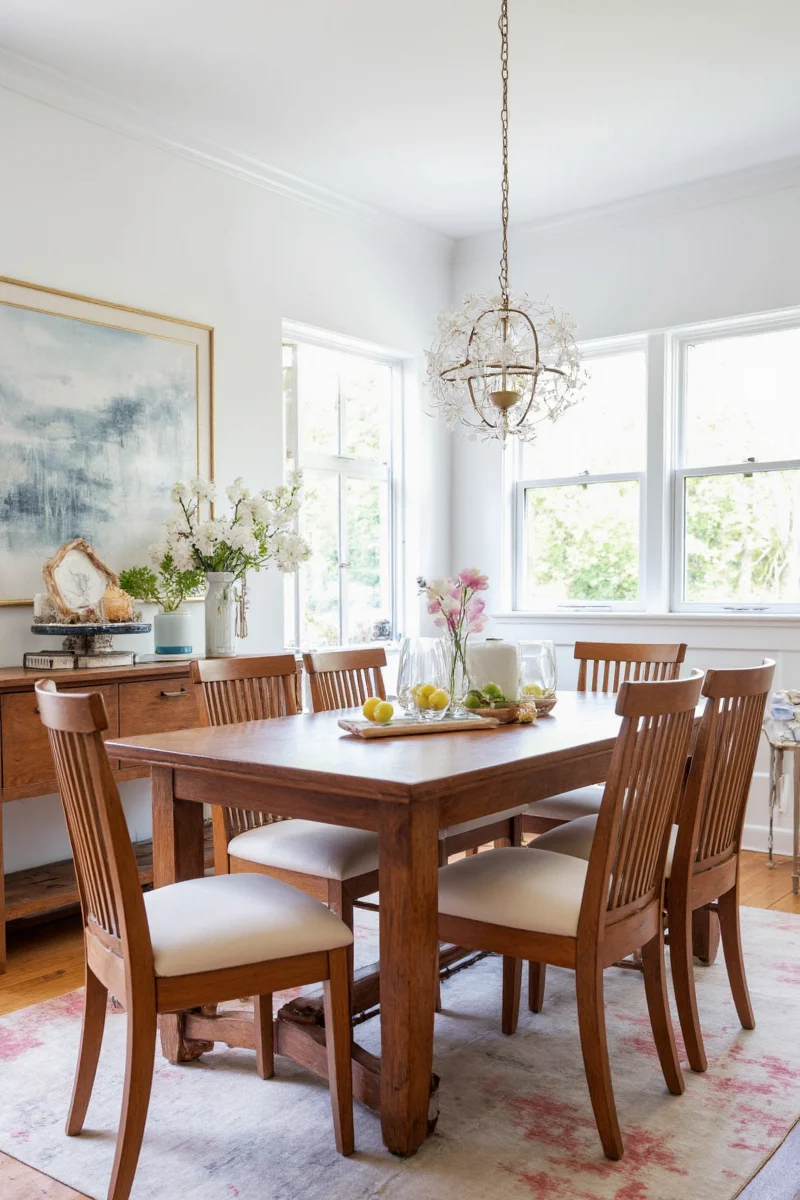
2. Sklum Upholstered Storage Bench
- Details: Matte black metal legs, beige fabric, built-in lid with gas pistons for easy opening.
- Features: Removable cushions, hidden storage compartment inside.
- Who Needs This: Parents looking to stash blankets, books, or extra plates within reach.
- Best Use Case: Breakfast nooks or under window seats.
3. AmazonBasics LED Under Cabinet Lighting Kit
- Details: 2-pack, dimmable, touch-controlled, battery-powered or plug-in option.
- Features: Bright white light with adjustable settings, motion detection mode available.
- Who Needs This: Home chefs and parents needing extra visibility during late-night snack runs.
- Best Time to Buy: Black Friday or Prime Day deals.
Final Thoughts: Design for Real Life, Not Just for Pinterest
In the end, your kitchen-dining zone doesn’t need to look like a showroom. What matters most is that it supports your family’s rhythm — from rushed weekday breakfasts to lazy Sunday pancake feasts.
By focusing on flow, function, and fun, you’ll create a space that invites conversation, connection, and the occasional mess. After all, isn’t that what family life is really about?
Got tips of your own? Share them in the comments below. Happy decorating!
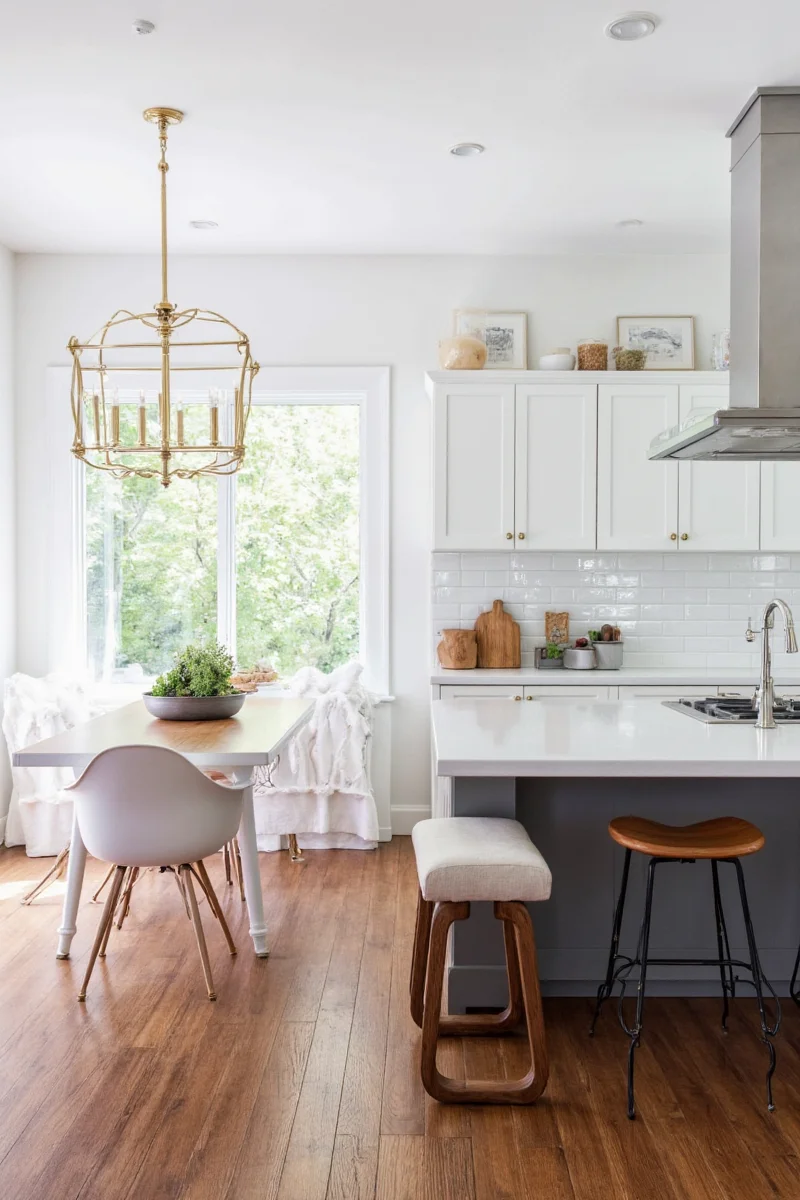

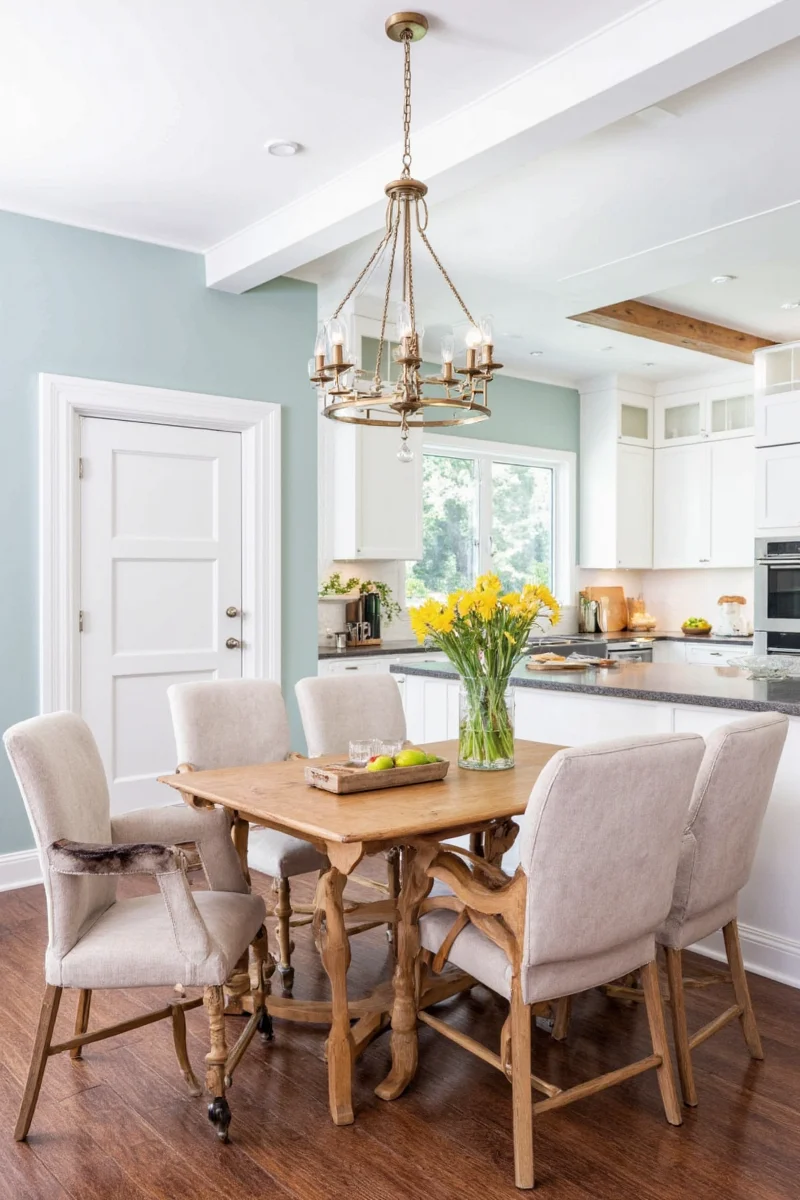









 浙公网安备
33010002000092号
浙公网安备
33010002000092号 浙B2-20120091-4
浙B2-20120091-4